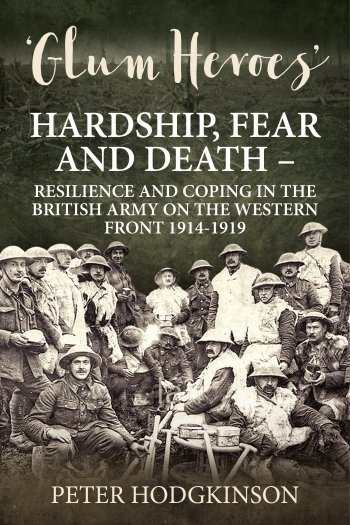Resilience and Coping - 'Glum Heroes'
IWM Q 48951
Resilience and Coping - 'Glum Heroes'
IWM Q 48951
Modern preoccupations rest sentimentally on the presumed suffering and trauma of the individual soldier – the soldier as ‘victim’.
'If I were fierce, and bald, and short of breath
I'd live with scarlet Majors at the Base,
And speed glum heroes up the line to death. '
Siegfried Sassoon: 'Base Details' (4 March 1917)
Modern preoccupations rest sentimentally on the presumed suffering and trauma of the individual soldier – the soldier as ‘victim’.
'If I were fierce, and bald, and short of breath
I'd live with scarlet Majors at the Base,
And speed glum heroes up the line to death. '
I'd live with scarlet Majors at the Base,
And speed glum heroes up the line to death. '
Undoubtedly serving in the trenches was a feat of endurance, and the question is rightly posed: ‘How did they do it?’

Peters’ second book on the war addresses just this question – how those who fought dealt with hardship, fear and death.
The focus of Glum Heroes, published by Helion in 2016, is on resilience and coping. It examines the attitudes and beliefs about the expression of thought and emotion prevalent in the Edwardian era, particularly the pervasive influence of stoicism and the emphasis on manliness, and their joint impact on thought and behaviour in the trenches. It is demonstrated how it is possible to misunderstand the nature of friendship as a support, or the role of religion.
If the Great War soldier’s coping mechanisms are to be understood, then we need to move away from the modern view of how ‘stress’ is best dealt with, and understand the sustaining power of the attitudes of the time which have come to be seen as archaic and irrelevant.
Review in 'Stand To!'
(Journal of the Western Front Association)
'The length and breadth of research, the reach and depth of analysis and the incisive writing ... this is a challenging re-evaluation of men at war and of them dealing with its unique horrors and is certainly worthy of its five star ratings’.
Review in Newsletter of the Society of the Friends of the National Army Museum:
‘This volume deserves attention as it is written by a practitioner who knows about of what he speaks. It avoids both sentimentalism and the easy trap of viewing earlier times from a modern moral perspective. Most highly recommended, and far beyond just students of the First World War.’
Alexander Falbo, historian in residence at the Marine Corps University, wrote:
'One of my favourite pieces to emerge from the recent scholarship. A masterly interdisciplinary synthesis.'
A five star review on Amazon describes 'Glum Heroes' thus:
‘This is one of the best books I've read on the Great War in thirty years and more of interest in it. It tells you how it was to be a human being in the conflict, and the varying responses and coping mechanisms used. And it places the emotional responses to the soldiers war into a contemporary background so we don't see things from a century ago through modern eyes. Absolutely superb.’
SOLDIERS' LETTERS - MAINTAINING IDENTITY AND MANAGING SEPARATION
Historians often read letters from soldiers at the front in terms of what they can tell us about the war. Letters were, however, also a vehicle for coping - they were, after all, the only means of contact with loved ones at home. But they did more than simply boost morale. Letters spanned the soldier's two worlds, home and war, creating the possibility of maintaining the identities the soldier had been forced to abdicate - husband, father, son. For a short period, whilst reading them, the reader could be in a world that was not
the war, and return to an identity that was not
as a soldier.
In 'Identity and Separation - The Letters of Private Frederick Whitham' (published in Stand To!
in 2015), Peter investigates the content of the letters of a private in the Yorkshire Regiment who would be wounded at Neuve Chapelle and killed at Loos in 1915, and analyses the way he managed the balance between the 'home world' and his 'war world'.